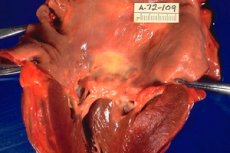Medical expert of the article
New publications
Rheumatic pericardial lesions
Last reviewed: 29.06.2025

All iLive content is medically reviewed or fact checked to ensure as much factual accuracy as possible.
We have strict sourcing guidelines and only link to reputable media sites, academic research institutions and, whenever possible, medically peer reviewed studies. Note that the numbers in parentheses ([1], [2], etc.) are clickable links to these studies.
If you feel that any of our content is inaccurate, out-of-date, or otherwise questionable, please select it and press Ctrl + Enter.

Rheumatic pericardial lesions are often observed against the background of rheumatic and autoimmune diseases, in which the level of sensitization of the organism is increased, increased autoimmune aggression is manifested. It is worth noting that in this case the body shows increased aggression towards its own body structures, perceiving them as genetically foreign agents. If you suspect a rheumatic process, it is absolutely necessary to take rheumatic tests, first of all, the analysis of c-reactive protein.
In this case, first an aseptic autoimmune process develops, then the usual inflammatory process develops in the area of pericardium. The disease can occur in both acute and chronic forms. In the acute form, the symptoms can be eliminated after 3-4 weeks. Whereas the subacute and chronic form is characterized by a long recurrent course, in which full recovery does not occur. Only remission (short-term) is observed. As the main symptom is a sharp pain in the heart area. Also the process is accompanied by a violation of blood circulation, nutrition of the heart muscle. Heart tissue is gradually destroyed, heart tissue is replaced by connective tissue, the heart loses its ability to contract.
Rheumatic lesions often occur against the background of general somatic diseases. Often such a condition is a consequence of a recent angina, pneumonia, immunodeficiencies. Often there is an accumulation of fluid, the contraction of the heart muscle is hampered, there is friction of the heart membranes.
With adequate treatment, recovery is possible. But in most cases, the disease passes into a chronic form. In most cases, pericarditis of rheumatic origin have a recurrent course, and rarely pass completely and without a trace. It is worth noting that not only a cardiologist, but also an immunologist should be involved in the treatment. It is necessary to look at the immune status of the person, and take a number of measures aimed at normalizing the state of the immune system, reducing autoimmune aggression.

